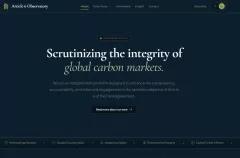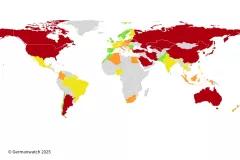Bonn, Germany - An immediate halt to new oil and gas investments and a phase-out of production should be the focus of the COP28 climate summit this year, as the sector is acting like there's a goldrush, not a climate crisis, the Climate Action Tracker warned today.
The CAT today released a summary of government action around oil and gas production and exports, showing that even developed countries like the US, Norway, Canada and Australia are all continuing to increase production and exports, and pour subsidies into the sector.
- The US, the world’s largest oil and gas producer, has more than doubled oil production since 2010 and increased gas production by 60% so that by 2021 its oil and gas exports accounted for about 1.6 GtCO2e of emissions. And its production is projected to continue increasing.
- Australia, the world's largest LNG exporter, projects an 11% increase in LNG production between 2020 and 2030, aiming to export 88 Mt annually by the end of the decade, which manufacture and combustion would cause emissions of about 275 MtCO2e/year.
- Norway’s fossil fuel exports are around ten times its domestic emissions.
"Developed countries have absolutely no excuse: the science tells us new oil and gas investments should have ended yesterday. Richer countries need to lead on this, and set phase-out dates for all fossil fuel production," said Mia Moisio of CAT partner organisation NewClimate Institute.
"An oil and gas phase-out agreement is what we should see coming out of COP28, along with agreeing a global target for renewable energy to enable this," she said.
COP28 President UAE’s action to support oil, gas and CCS casts serious doubts on its ability to broker an ambitious deal.
"With its focus on “emissions free” fossil fuels and CCS, the UAE is clearly pushing an agenda to distract attention from a fossil fuel phase-out which, if successful, would lock in large scale oil and gas production," said Moisio.
The CAT pointed out that relying on technologies like CCS for fossil energy, and using fuels like ammonia to co-fire coal plants were dangerous distractions.
"There is no such thing as 'emissions free' fossil fuels. CCS should not be used to reduce emissions in the electricity sector when vastly cheaper renewables are readily available," said Claire Stockwell of CAT partner organisation Climate Analytics.
The CAT noted there was already a globally-accepted consensus on phasing out coal, with many governments signing up to a coal exit, agreements at COP, G20 and G7 level, and international and national financial institutions on their way to defunding it, but there's no such agreement on oil and gas.
"There is still no global target for renewable energy, which should also be a goal for COP28," said Stockwell. The CAT stresses that additions need to be significantly above 1 TW per year for a sustainable decarbonisation of the electricity sector.
None of the world's largest fossil fuel producers have committed to ending new oil and gas investments, instead expanding them. Only very minor producers have either ended - or pledged to end - oil and gas production. Some governments, like Norway, are credited for their reasonably good targets for cutting emissions at home, but are continuing with massive oil and gas exports.
The biggest western oil companies paid out USD 110bn in dividends and share repurchases, higher than the Paris Agreement's global finance target of USD 100bn by 2020, which developed countries have still not met.
"Meanwhile many developing countries still lack access to clean and affordable energy and around the world people increasingly suffer from energy poverty at least in part exacerbated by high fossil fuel prices and lack of finance for renewables," said Stockwell.
The CAT also notes, that despite the urgent calls from the previous COPs to strengthen national climate targets in 2022 and 2023, no major country has done so this year. Our temperature estimates under 2030 targets remain at 2.4°C by 2100.








